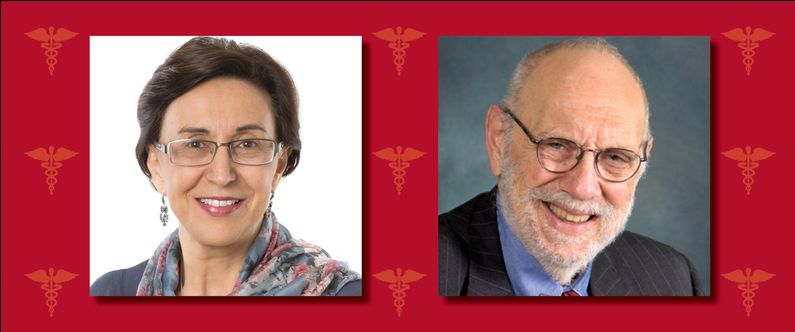Two experts speak at WCM-Q Grand Rounds
 Dr. Fatima Janjua of Sidra Medicine and Dr. Laurence Guttmacher of the University of Rochester School of Medicine spoke at WCM-Q Grand Rounds.
Dr. Fatima Janjua of Sidra Medicine and Dr. Laurence Guttmacher of the University of Rochester School of Medicine spoke at WCM-Q Grand Rounds.
Experts in the fields of autism and the role played by the study of the humanities in medical education spoke at the most recent instalments of Weill Cornell Medicine-Qatar’s Grand Rounds.
Dr. Laurence Guttmacher, professor of clinical psychiatry, clinical medical humanities and bioethics at the University of Rochester School of Medicine discussed the important ways that study of the humanities can help medical students acquire transferable skills that will make them more effective physicians.
Dr. Guttmacher said: “At a time when stress on physicians is mounting rapidly, where talk of burnout is all the more frequent, and where lots of forces are taking us away from the very thing that we entered the field of medicine, which is our work with patients, the humanities can be of great help. For me, one of the greatest benefits of making use of the humanities is that it reminds us of the joy of working with our patients and really doing some good.”
Dr. Guttmacher said that the study of the humanities helped doctors by increasing their comprehension of patients’ stories, enhancing clinical communication and observation skills, increasing inter-professionalism and collaboration, and ingraining aspects of professionalism, altruism and collaboration. He also said that the humanities appeared to help decrease rates of burnout and bolstered compassion for patients. He also outlined ways to increase the study of the humanities in the education of medical students and discussed strategies for measuring and documenting the impact of the humanities on students.
Grand Rounds, which has been held online since that start of the pandemic, is presented to an audience of physicians, nurses, dentists, pharmacists, allied health professionals, students, researchers and educators.
Following Dr. Guttmacher’s sessions, Grand Rounds heard from Dr. Fatima Janjua, division chief of developmental pediatrics, senior attending physician in neurodisability at Sidra Medicine, and assistant professor of clinical pediatrics at WCM-Q. In a session titled ‘The Whats, Whys and Hows of Autism,’ Dr. Janjua discussed the core symptoms of autism, outlined the different types of autism spectrum disorders, and gave recommendations about how to apply some simple autism-specific behavioral strategies.
Dr. Janjua said that autism was characterized by difficulty with language, communication, social awareness and interaction. People with autism often exhibit repetitive behaviors, have narrow interests, and might have sleep disorders or be clumsy. There is a wide variation in difficulties and strengths of each individual with autism, she explained, with around 75 percent being classed as high functioning.
Dr. Janjua said: “Autism is a developmental condition affecting the way the brain affects information. It occurs in varying levels of severity and is a lifelong condition – it is hard, but we have to explain to parents very clearly that autistic children become autistic adults. But this does not mean that their difficulties will continue the be same for the rest of their lives; there is actually in many cases an excellent prognosis for some of these children.”
Dr. Janjua said that the cause of autism remains unclear but that many experts believe it does not result from a single cause. However, it is certain that autism is not caused by emotional deprivation or the way a child has been brought up, she said. Management of autism spectrum disorder (ASD) is multi-faceted and differs for each individual. Generally speaking, children with ASD feel happier and calmer if they have clear and regular routines to follow, are warned well in advance when something new is going to be introduced, are given visual aids to help them follow instructions, and have a quiet place to relax if they become agitated. A multi-agency approach that draws upon the services of specialist educators, speech therapists, pediatric neurologists, psychologists, occupations therapists and social workers can be highly effective, she said.
Both lectures were accredited locally by the Ministry of Public Health’s Department of Healthcare Professions – Accreditation Section and internationally by the Accreditation Council for Continuing Medical Education (ACCME).